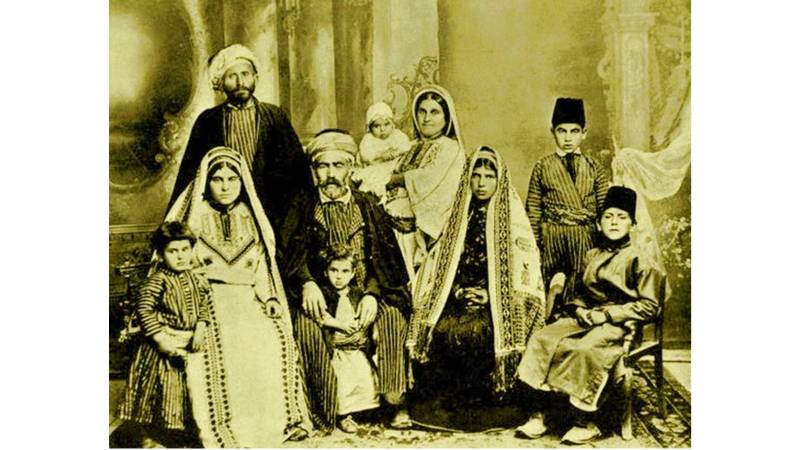
Proponents of Israeli policy, like Prime Minister Benjamin Netanyahu, tell us that Palestinians never had a state. But the fact remains that there was a mandate state of Palestine, under British colonial rule, and that this administrative unit had a long basis in history. A Palestinian society existed from time immemorial in Palestine. The Jewish presence in Palestine was limited – according to the Biblical lore, for only about 250 years after they entered the land from Egypt.
The Canaanites, Jebusites and Philistines were the groups that lived historically in this land. In 637 AD, the holy city of Al-Quds was opened up to become Islamic land under Caliph Umar (RA). Since that point in time, it may be considered to have been part of the Islamicate world, as it entered the rule of the Rashidun (rightly-guided caliphs).
Centuries later, Hussein Bin Ali, the Sharif of Makkah, had been allowed by the Ottomans to have substantial autonomy and essentially ruled Makkah on behalf of the Ottomans. This privilege was given to him as the Hashemite descendant of the Prophet (PBUH). However, despite regional autonomy, the Sharif of Makkah had been concerned about the growth of the Ottoman Hijaz railway which opened in 1908 and brought home the impact of Ottoman rule very tangibly to Makkans as the trainline reached Madinah. Pilgrims could now travel to Madinah by train from Istanbul’s Hayder Pasha station, or from Damascus or even from Heyfa حَيْفَ ,Palestine.
Sultan Abdul Hamid II ruling from 1876-1909, was a pan-Islamic Ottoman leader. Imagine his irritation when he received an offer from Zionists to purchase Palestine in exchange for paying off the Ottoman state debt. The Zionists offered to provide propaganda for the Ottoman Sultan in Europe in exchange for opening Palestinian lands to Jewish settlement and transferring governance to the Jewish people. The Caliph declined this offer with the famous saying:
“I will not sell a single inch of the country, because it is not mine, it belongs to all the Muslims. They paid for this empire with their blood. And we will redeem it with our blood. Let the Jews keep their millions. If the empire is partitioned, they can get Palestine for free, but that will happen over our dead bodies.”
A Jewish banker, Emmanuel Carasso, was a friend of the Ottoman Grand Vizier Talaat Pasha and a member of the delegation that informed Caliph Abdul Hamid II about his dethronement. Thessaloniki deputy Carasso was the most powerful person of his time and also the organizer of Jewish migration to Palestine. The Young Turks who dethroned Caliph Abdul Hamid II in 1909 exiled the Caliph to Thessaloniki and imprisoned him in the house of a Jewish banker called Allatini. All territories owned by the Caliph were nationalised and Jews were allowed to settle in Palestine by the Young Turks. While they offended all Ottoman communities with their Turkification politics, they rubbed elbows with Zionists because they helped the Young Turks seize power. The Young Turks paid their debt to their Jewish allies by helping Carasso multiply his fortune and allowing him to carry out a black food market during the Great War.
With notions of the growth of nationalism, aspirations began to emerge across the Ottoman world for self-rule. The British had promised Sharif of Makkah an Arab Khilafat in return for an Arab uprising against their Ottoman overlords. With the outbreak of World War 1, however, Britain had made conflicting promises – since a homeland to the Jewish people in Palestine had also been promised. Further the British and French had signed the infamous Sykes-Picot agreement, named respectively after the British and French foreign ministers to divide up the Arab region between these two powers. This agreement promised a division of the Arab regions into a multiplicity of states. This gave birth to artificial states such as Lebanon to empower the Maronite Christians of that land who would henceforth hold the position of Head of State as President, with a Sunni Muslim as Prime Minister and a Shia Muslim as speaker of the House of Parliament.
The Hashemite dynasty, far from inheriting an Arab Khilafat, would end up with control of Jordan – as they lost the Arabian Peninsula to the Wahhabis. The British had not only armed the Hashemites against the Ottomans, but also the Wahhabis. When it came to decision time, the British officer John Philby preferred Wahhabi rule over the Arabian peninsula, and the Hashemites lost with their dreams of Arab glory and Khilafat.
In 1917 an offensive from Egypt to take Palestine by the British with Indian and Australian forces pushed into Ottoman Gaza. The Indian forces included the infantry of the 3rd (Lahore) Division. Palestine eventually fell to the invaders, as the Ottomans withdrew in defeat. By September 1918, Ottoman Palestine was no more.
In 1922, the Jewish population in Palestine was 83,794 from a total population in Palestine of 757,182. Between 1920 and 1945, a whopping 367,845 Jews migrated to Palestine, but the Jews were still not a majority in Palestine.
During the 1930s, the British were engaged in heavy fighting against the Palestinians and finally managed to disarm the population. At the same time British officers such as Orde Wingate trained Zionist immigrants in techniques to attack Palestinian villages. Zionists were armed by British forces and assisted in seizing Palestinian land to establish settlements.
During the last year of British rule, Zionists ethnically cleansed Palestine, committing the notorious massacre of Deir Yassin in April 1948, where Palestinian men, women and children were butchered by Menachem Begin’s fascist Lehi and Irgun militias. Women were forced to strip while Zionist soldiers photographed them naked. Pregnant women were disembowelled, young females raped and murdered. The village baker of Deir Yassin was captured by Zionists in his bakery with his very young boy. The Zionist soldiers ordered the baker to throw his minor son in the oven: when the baker refused, he was beaten. The Zionist soldiers grabbed the terrified little boy who vainly clutched his father’s leg for security and threw him into the fire. The father shortly thereafter followed the fate of his son.
Deir Yassin symbolised the plight of Palestinians villages. During the Nakba or catastrophe, over 500 Palestinian villages, including their mosques and churches, were mercilessly destroyed by the Zionists to prevent a return of Palestinian refugees. The city of Heyfa fell in April 1948 and was ethnically cleansed, with the residents forced into Lebanon. Yaffa, the cultural heart of Palestine, fell to the Zionists on 14 May 1948 with only 3,800 Palestinians left from a population of 60,000 that had been driven into the sea by Zionist attacks.
The Zionists had prepared lists of Palestinian men who had fought against the British in the 1930s. As the Zionist militias entered Palestinian villages, they called out the names of the Palestinian men with fighting experience and executed them. In the city of Al Lydd (Lod) the Zionists militias under Yitzhak Rabin, who signed the Oslo Peace Accords with Palestinians and received the Nobel Prize, committed a massacre. Rabin’s men murdered 170 Palestinian men, women and children who had sought refuge in the largest mosque in the city of Al Lydd. Thereafter the remainder of the residents were expelled in the direction of the West Bank city of Ramallah across difficult barren hilly country. Many of the people on this long death march died of thirst and hunger.
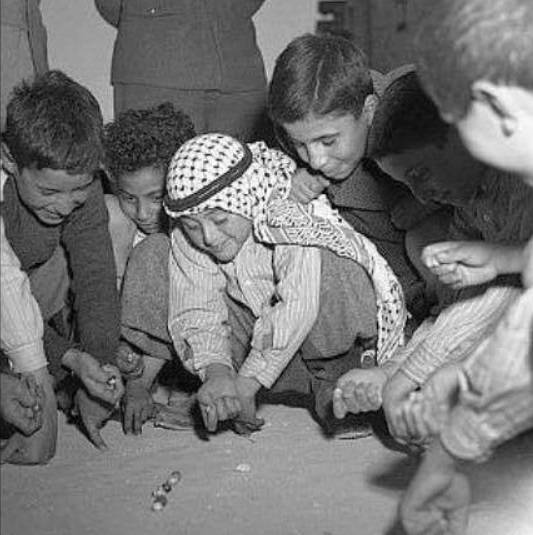
In 1948, the Zionists seized 78% of historic Palestine, leaving East Jerusalem and the West Bank in Jordanian hands. The Jordanian Hashemite ruler and the Zionists had connived with one another to jointly seize Palestine. The Egyptian army meanwhile had advanced beyond Gaza before the Zionists pushed them back, and until 1967, Gaza was under Egyptian control. However, in 1967 the Israelis attacked and destroyed the Egyptian air force on the ground and advanced to seize Gaza, East Jerusalem and the West Bank among other territories.
Amongst this terrible atmosphere of defeat, one brave Muslim soldier stood tall, he never forgot his duty. He stayed in the position that his officer had left him. A Turkish journalist noticed an elderly man standing watch over the courtyard of the Al-Aqsa mosque during 1972. The elderly man was dismissed by the Turkish journalist’s guide as a lunatic who was always present during day light hours in that courtyard. The journalist states that he had not made up his mind whether to talk to this old man. The old man wore a patched up overly repaired uniform which had known much better days. The Turkish journalist writes:
"He realised that I was getting closer but he didn’t budge. I said in Turkish ‘Selamun Aleykum baba (father).’ He moved his head slightly to me, hesitantly replied ‘aleykumselam ogul (son)’ with a wobbling rusty voice. I asked ‘What on earth are you doing here, who are you?’ He replied with wobbling voice again, “I…I am Corporal Hasan from the 20th Corps, 36th Battalion, 8th Squadron heavy machine gun team. His voice wasn’t wobbling anymore. He continued as if he were giving an oral report: ‘I am Corporal Hasan from Igdir region of Anatolia. Our troop raided the British on Suez Canal front in the Great War. Our glorious army was defeated at the Canal. To withdraw was requisite now. The heirloom lands of our ancestors were about to be lost one by one. And then, the British pressed upon the gates of Quds, occupied the city. We were left as rear guard troops at Quds.”
This soldier was amongst the Ottoman Army rear guard who had been left behind to hand over the city to the attacking British crusaders. The Ottoman rear guard mission was to prevent the sacred city from possible pillages until British troops enter. The British forces had wanted a small Ottoman troop to stay in the city to avoid adverse public reaction, which might conclude that they had defiled Al Quds with their presence.
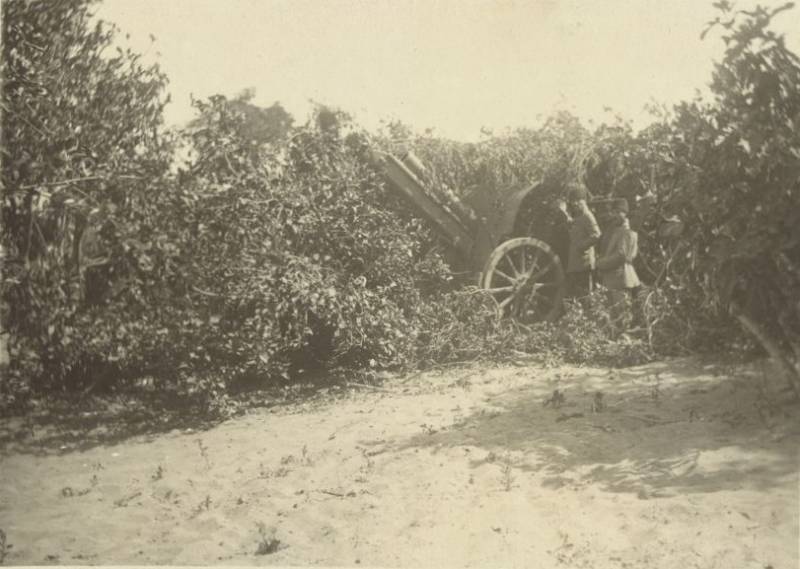
The Ottoman soldier recounted:
“My rear guard troop consisted of fifty-three privates. We got the news that after the truce (Armistice) the army was discharged. Our lieutenant was leading, said ‘My lions, our country is in an arduous situation. They are discharging our glorious army and calling me to Istanbul. I have to go, if I don’t I’d be in defiance of authority, by failing to obey the order. Anyone can return to the homeland if he wills, but if you follow my words, I have a request from you: Quds is an heirloom of Sultan Selim Han. Remain on the guard duty here. Don’t let the people worry about ‘Ottomans have left; what we are going to do now.’ The Westerners will exult if Ottomans left the first qiblah of our beloved prophet. Don’t let the honour of the Islam and glory of Ottoman trampled on.’”
“Our troop stayed in Quds and, almost suddenly the long years vanished. My brothers from the troop passed away one by one. We weren’t mowed down by the enemy, but the years. Only I am left here. Just me, a corporal Hasan in the grand Quds,” he continued.
The old Ottoman warrior wished for one last thing – for the journalist to take a message for him to his commanding officer in Turkey:
“When you arrive in Anatolia, if you happened to pass Tokat Sanjak, please stop by to Lieutenant Mustafa, the commander who deployed me to guard Al-Aqsa Mosque and trusted these sacred places to me. Kiss his hands for me and tell him: ‘Corporal Hasan from Igdir Province of the 11th Machine Gun Team still remains at Quds as you deployed him to [...] He didn’t abandon his duty and wishes your blessings, commander.”
However, though the journalist tried his best, he could not convey the message to Lieutenant Mustafa, since he was long since deceased. By 1982, Corporal Hassan, who had so loyally served the Ottoman Caliphate, was called back to his heavenly master.
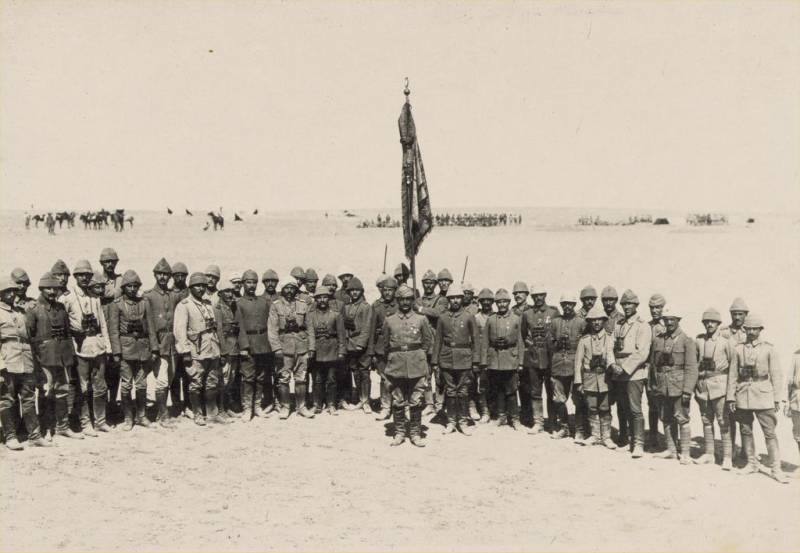
The brave Ottoman Ghazi Corporal Hassan lives on since he was remembered by an Islamic charity which erected a finely built mosque named after the Corporal. While Israel was trying to ban the azan in Al Quds, the first azan sound was heard from the minarets of Onbasi (Corporal) Hasan Mosque in Tel al-Hawa, Gaza. With the present onslaught on Gaza, 146 mosques have been partially destroyed and 66 completely destroyed. Whether the minarets of Onbasi Hasan Mosque stand tall like our Ottoman Ghazi Corporal of yesteryear remains open to question.
An Ottoman soldier entrusted £30,000 in Ottoman funds with a Palestinian man named Omar Aloul. The Aloul family said the soldier had requested they keep his money safe during the war that witnessed the end of the Ottoman Caliphate over Palestine, saying: "If we return, I will take it back." The soldier never returned, so in 2021 the family presented the funds in Nablus city to Turkey’s Consul General Ahmet Riza Demirer.
Israel respects neither mosque nor church or hospital. The third oldest church in the world, Saint Porphyrius, was bombed to smithereens by the Israelis, who are overly generous with their US-donated bombs. All these buildings had housed desperate refugees, praying to their Lord and hoping that the traditional sanctuary offered by the house of God would be respected by the Zionists. The house of God and the shiffa khana (hospital) have been turned into burial chambers for Palestinians.
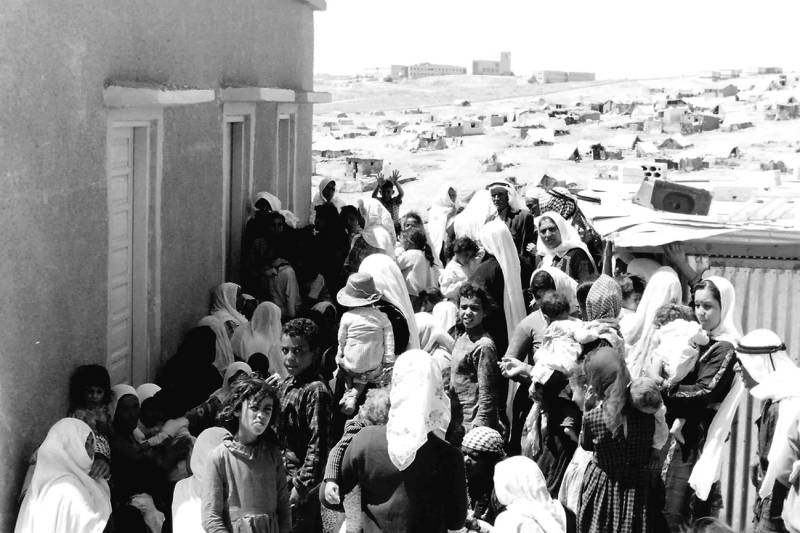
Regretfully, the leaders of today do not pay heed to the difficulties of the Palestinians. Let us recall a ruler who lived not so long ago. Faisal bin Abdulaziz Al-Saud declared:
“What are we waiting for? Are we waiting for the international conscience? Where is the international conscience? Verily, the noble Quds calls on you and seeks help from you so that you can save it, from its adversity and with what it has been afflicted with. So what makes us afraid do we fear death? And is there a better death and more honourable than a person dies as a mujahid in Allah’s way. O Muslim brothers, we want to make a reform an Islamic revival whereby it is not invalidated by nationalism or racism or partisanship but indeed an Islamic calling, a calling to jihad in Allah’s way. For the sake of our religion and our creed in defence of our holy grounds and our sanctuaries.”
Faisal bin Abdulaziz Al Saud of Saudi Arabia made the West pay a heavy price for supporting Israel in 1973 by cutting back on OPEC oil production and raising oil prices. He was a visionary leader, which was the reason why he was assassinated in 1975, most likely by the CIA.
In 2000, Ehud Barak had proposed to give the Palestinians a final offer of a non-contiguous state in the West Bank and Gaza consisting of small enclaves of Palestinian populations surrounded by Zionist settlements. The Israelis would not concede a right of return for Palestinians forced into exile during 1948 or 1967. Unsurprisingly, this mean-spirited offer was rejected.
When the Ottomans left Palestine, 80% of Palestine was state land. Today that land, whether waqf or state land, is used for the benefit of Jewish people. The indigenous people are being slowly displaced in favour of Eastern European migrants. Muslims and Christians are prevented from practising their faiths. Zionist soldiers at the gates of Al-Aqsa decide who will and who will not have permission to pray in the third holiest mosque of Islam. Those who live near Al-Aqsa or who venture through countless check points to arrive at the gates to Al-Aqsa are often turned back by Zionist soldiers from the very entrance to this holiest of places. Palestinians Christians are prevented from celebrating their Easter festivities by Zionist forces.
Meanwhile, we witness numerous rulers with Muslim names who trade openly or in secret with Israel. Politicians buy Pegasus software from Israel, so that they can better spy on their own dissidents. In our lands, we have ‘leaders’ who would rather invest the ummah’s money in the USA, in Papa Johns, or worse still, buying US weaponry. The ignominy of the Muslims is illustrated by the fact that the permanent members of the UN Security Council are grotesque abusers of Muslim human rights. Therefore, given that the Muslim nations’ leaders are bent on serving the interests of the USA, the solution to the Palestinian plight has fallen upon the brave shoulders of the Palestinian nation.
The Qadi Abu Nayad al-Iarawi, in similar circumstances to those we have today, during the Crusades, declared to an indolent ruler at Baghdad, the Caliph al Mustauhir Billah:
“How dare you slumber in the shade of complacent safety, leading lives as frivolous as garden flowers, while your brothers in Syria have no dwelling place save the saddles of camels and the bellies of vultures? Blood has been spilled! Beautiful young girls have been shamed and must now hide their sweet faces in their hands! Shall the valorous Arabs resign themselves to insult, and the valiant Persians accept dishonour?”
The people around the then Caliph broke out in lamentations and sobs. Their cries of sorrow further incensed Larawi, and he declared:
“Man’s meanest weapon is to shed tears when rapiers stir the coals of war.”

